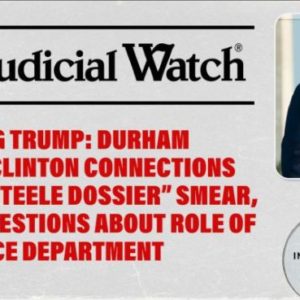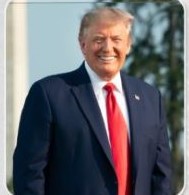SOURCE: Judicial Watch
Special Counsel John Durham continues his steady march to the truth about the Russia mess—the sensational allegations of Trump “collusion” with Russia that disrupted and nearly derailed the Trump presidency.
Last month, we reported on the Durham indictment of Clinton campaign adviser Michael Sussman for lying to the FBI about attempts to link Trump to a Kremlin-connected bank. Last week, Durham struck again, exposing the Clinton connections behind the notorious Steele Dossier—the compendium of anonymous smears, supposedly from Russian sources, that electrified the media and the liberal-left mob.
The new indictment is an important step, but critical questions remain about the involvement of senior Obama administration officials and government agencies—mainly the Justice Department and the FBI—in the years-long attack on Trump.
On Thursday, Durham indicted Russian affairs analyst Igor Danchenko on five counts of lying to the FBI about sources he used in compiling information for the Steele Dossier. Danchenko was a key source for Christopher Steele, the former British intelligence agent hired by Clinton allies to dig up dirt on Trump. Danchenko, the indictment notes, collected “the information that ultimately formed the core of the allegations” in the Steele Dossier.
One key source for Danchenko “was a long-time participant in Democratic Party politics” and “later an executive at a U.S. public relations firm,” identified in the charging document as “PR Executive 1.” The Associated Press later confirmed that “PR Executive 1” is Chuck Dolan, a former director of the Democratic Governors Association and an adviser to Hillary Clinton in both of her presidential campaigns.
Danchenko and Dolan were in business together, but the Russia analyst repeatedly lied to the FBI when asked about Dolan, claiming at one point that Dolan would not “be in any way involved” with the Steele Dossier allegations. The lies were important, the indictment says, because Dolan’s “role as a contributor of information to [the Steele Dossier reports] was highly relevant and material to the FBI’s evaluation of those reports” not least because Dolan “maintained historical and ongoing involvement in Democratic politics.”

The indictment suggests that Dolan may have been the figure behind the notorious Steele Dossier claim that Trump consorted with prostitutes at the Moscow Hotel and urinated on a bed in the Presidential Suite where the Obamas once stayed. Dolan, the indictment says, stayed at the Moscow Hotel in June 2016, receiving a tour of the hotel, including the Presidential Suite, from the general manager and others. The indictment notes that “references to the Moscow Hotel, the Presidential Suite, and a Moscow Hotel manager” would appear in the Steele Dossier. Danchenko would later claim that he stayed at the Moscow Hotel in June 2016 and cite in the Steele Dossier “a senior (western) manager of the staff at the hotel” as one of the sources for the Trump allegation. But Danchenko did not in fact stay at the Moscow Hotel in June 2016, the indictment notes.
In another important development, the indictment reveals that the Russia analyst repeatedly lied about an anonymous call from someone he believed to be the president of the Russian-American Chamber of Commerce. The person, the Steele Dossier reported, spoke of a “well-developed conspiracy of cooperation” between the Trump campaign and Russian figures. This is a serious charge. The indictment notes that the claim of a “conspiracy of cooperation” in the Steele Report “would ultimately underpin” four Foreign Intelligence Surveillance Act (FISA) warrants targeting a Trump campaign adviser. Durham does not name the figure, but news reports identify him as Trump adviser Carter Page.
The allegations about the call from the Chamber of Commerce president, the indictment notes, “were highly material to the FBI” because they “formed the basis of a [Steele Dossier] report that, in turn, underpinned the aforementioned four FISA applications targeting a U.S. citizen…the allegations…played a key role in the FBI’s investigative decisions and in sworn representations that the FBI made to the Foreign Intelligence Surveillance Court throughout the relevant time period.”
Close followers of the Russia scandal will recognize that Durham is teeing up a question of enormous consequence: why was the FBI relying on Christopher Steele for critical investigative and legal decisions? Any competent investigator would immediately have recognized Steele as damaged goods.
By October 2016—the month of the first FISA warrant application—warnings were circulating inside government circles about Steele’s reliability and bias. Months earlier, in summer 2016, according to reporting by John Solomon, a senior Justice Department official warned other officials at Justice and the FBI that Steele’s “work was opposition research connected to Hillary Clinton’s campaign.” Judicial Watch obtained FBI documents under the Freedom of Information Act revealing that in July 2016, then-Associate Deputy Attorney General Bruce Ohr admitted in an FBI interview that information on “Trump’s ties to Russia were going to the Clinton campaign, Jon Winer at the U.S. State Department and the FBI.”
The documents revealed that Ohr was involved in efforts at the Justice Department, FBI, and State Department to dig up dirt on Trump. “The FISA courts weren’t informed of this corrupted process when they were asked to approve and reapprove extraordinary spy warrants targeting President Trump,” noted Judicial Watch President Tom Fitton. Ohr was removed from his post in December 2017.
Steele himself was no stranger to the FBI. Justice Department Inspector General Michael Horowitz noted that Steele was a confidential source for the FBI on matters unrelated to American politics from 2013 to 2016 and was paid about $95,000 for his services. In 2010, Steele reportedly began providing information to the FBI about corruption and doping at the World Cup soccer tournament. In 2015, according to a timeline compiled by a Senate Homeland Security Committee investigation, an FBI report raised questions about Steele’s contacts with Russian oligarchs, calling it “unusual” and recommending a review.
The lies of the Steele Report and Democratic Party disinformation operatives had broad consequences, deceiving the courts and sending the media and Congress and even a special counsel, Robert Mueller, into damaging and often reckless attempts to make something, anything, stick against a president they loathed. How far up the ladder did it go? What roles did senior Obama Administration officials play in the effort? What role did the Justice Department and the FBI play? It’s no exaggeration to say that the last, best bet for getting at the whole truth about the Russia mess now rests with one man: John Durham.
Read the Danchenko indictment here.

